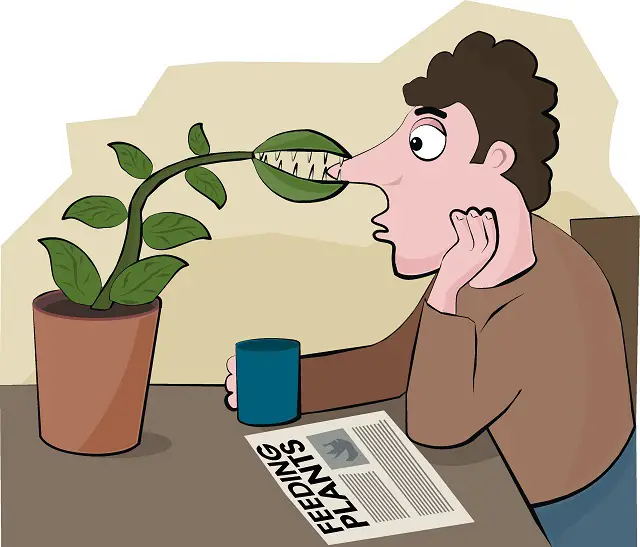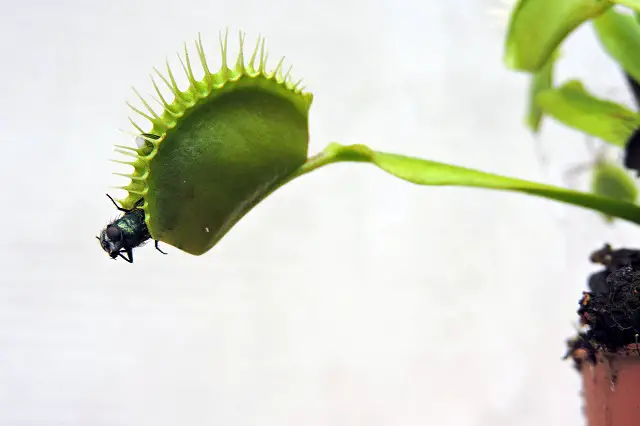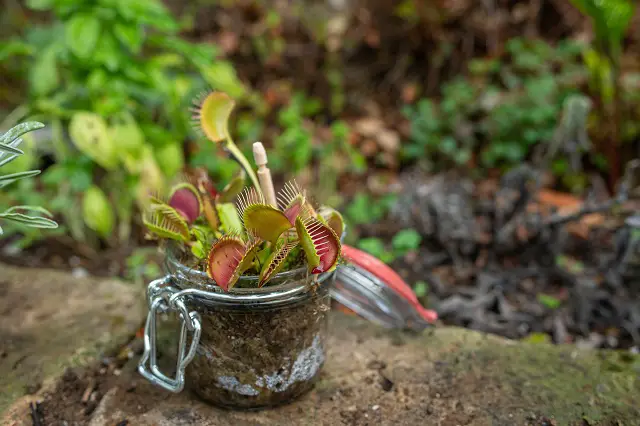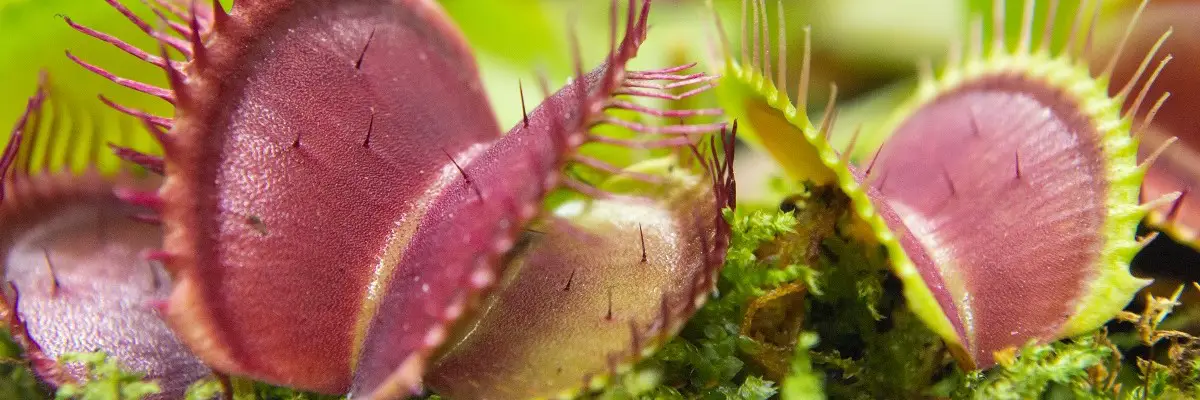Can Venus flytrap hurt humans?: Venus flytraps cannot bite humans in the traditional sense, as they lack teeth or any other sharp structures on their leaves. The Venus flytrap is an iconic carnivorous plant that has captured the imaginations of many. While it may look intimidating, can you actually get bitten by a Venus flytrap? The answer to this question is both yes and no.
What do Venus flytraps do to humans?
The most common issue associated with Venus flytraps is skin irritation from contact with the plant’s spines or bristles. The tiny hairs on the surface of these plants contain irritants that can cause an itchy rash if touched or brushed against bare skin for extended periods. It is best to avoid touching a Venus Flytrap directly and instead uses gloves to prevent any possible irritation.
Venus Fly Trap Allergic Reactions
In addition, some individuals may experience allergic reactions after coming into contact with this plant species due to its pollen-producing flowers during certain times throughout its growing season (May through October). Symptoms such as sneezing, coughing, and watery eyes may occur if someone has an allergy to this particular type of flower pollen, so it should be avoided at all costs during those months whenever possible.
While there are few risks associated with coming into direct contact with a venus Flytrap, caution should always be taken when dealing with these unique creatures since they possess potential allergens that could affect sensitive individuals. Therefore, taking proper precautions, such as wearing protective clothing and avoiding prolonged exposure, will help ensure that everyone remains safe while enjoying nature’s wonders!

What kills Venus flytraps?
One major issue is overwatering or having too much water around the plant’s roots. This causes root rot, eventually leading to the plant’s death as it cannot take up enough nutrients from its environment anymore due to all the waterlogged soil surrounding it. In addition, lack of light exposure or intense sunlight exposure can also cause problems for these plants as they need just enough sun each day to grow correctly and thrive without getting burned by too much heat from direct sunlight rays hitting them directly on their leaves throughout long periods during summer days when temperatures get really high outside.
Finally, another common killer for Venus flytraps is cold temperatures below 45 degrees Fahrenheit (7 Celsius). They cannot survive freezing weather conditions, so if you live somewhere with harsh winter months, make sure you bring your indoor venus flytrap inside where temperature levels remain warm above this threshold level at all times. Otherwise, your beloved pet might die very quickly due to these extremely low temperature changes outdoors. All in all, taking good care of Venus Fly traps requires knowledge about what kills them, so pay attention not only to watering schedules but also to how much light you provide each day, plus making sure outdoor temps never fall below 45F (7C) when winter season arrives near your area!
What happens if a Venus flytrap eats itself?
This carnivorous plant can catch and digest small insects but cannot digest its body parts. If a Venus flytrap eats itself, it is likely to die. A Venus flytrap will typically only eat when no other food sources are available in its environment; however, if one were to consume itself out of desperation or curiosity, then this could lead to its demise.
The process by which a Venus flytrap digests an insect involves trapping the prey within two lobes that contain tiny hairs known as trigger hairs. When these trigger hairs sense movement from within their grasp, they quickly shut tight and secrete digestive enzymes into the trap, which break down the bug’s proteins so that they can be absorbed by special cells on the inside of each lobe called glandular trichomes.
However, suppose a trap accidentally catches part of itself. In that case, these same digestive enzymes will start breaking down vital components like chloroplasts – essential for photosynthesis – resulting in severe damage or death over time due to lack of nutrition intake from any external source being present at all times for sustenance purposes.
In conclusion, although unlikely due to their natural instinctive behavior patterns, if a Venus Fly Trap does end up eating itself, then this would most certainly result in its eventual death because they do not have enough energy stored up nor possess any means necessary capable enough for them self-digestion.

Do Venus flytraps feel pain?
This is a question that has been debated for many years. Although it is difficult to answer this question definitively, some signs suggest that they may indeed be capable of experiencing pain.
The first indication comes from the plant’s physical response to stimuli. When something touches the traps of a Venus flytrap, it triggers an electrical impulse in the plant’s cells which causes them to close quickly and tightly around whatever triggered them.
This suggests that the plant can sense when something has touched its traps and respond accordingly; why would it bother closing its trap if this were not the case? Additionally, research on other carnivorous plants has found increased calcium ion levels in their cells when stimulated by prey – suggesting a heightened level of alertness or discomfort caused by stimulation from outside sources such as insects or other predators trying to steal their food source.
Finally, some scientists argue that because these plants have evolved complex mechanisms for capturing prey over millions of years – including sophisticated sensory organs like trigger hairs – they must possess at least some degree of awareness and, therefore, could potentially experience sensations similar to those experienced by animals with more advanced nervous systems such as humans do (i.e., pain).
While definitive proof remains elusive because we cannot ask these plants how they feel about being eaten! Based on what we know about their physiology and behavior patterns, it appears likely that Venus flytraps may be capable of feeling varying degrees of discomfort depending upon what stimulus activates them.

Can Venus Fly Traps Hurt Cats
Are you a proud pet parent of cats and wondering if Venus fly traps are safe for them? Well, the answer is both yes and no. While these carnivorous plants can make an interesting addition to your home, they may cause harm to your furry friends if ingested.
These plants contain proteins that break down insect prey into nutrients that the plant can absorb through its roots; however, this same protein could be harmful to cats when eaten in large amounts. Additionally, some of the other components found in Venus Fly Traps, such as calcium oxalate crystals, could also irritate a cat’s mouth or digestive system when ingested, leading them to experience nausea or vomiting symptoms as well as difficulty swallowing food afterward.
If you decide to keep one of these fascinating plants at home, you must keep it out of reach from your feline friend so they cannot get access by any means possible (i.e., placing it on high shelves or counters). Furthermore, you should also ensure regular monitoring so that any potential issues caused by ingestion are addressed quickly before things worsen further.
Lastly, it would be wise not only to inform yourself about what type of care these particular species require but also to consult an expert beforehand just in case there might be something else worth considering regarding safety precautions around pets too!


